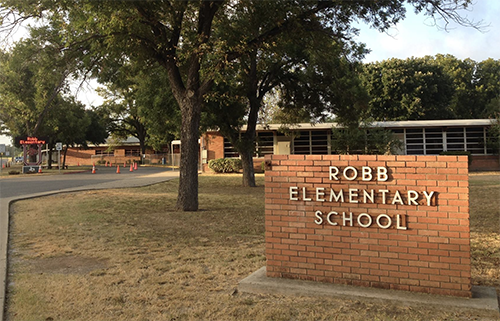Cornyn Op-Ed: A Year Later, Uvalde and the Answered Call for Change
 On the one-year anniversary of the shooting at Robb Elementary School in Uvalde, Texas, U.S. Senator John Cornyn (R-TX) authored the following op-ed in the Austin American-Statesman detailing implementation of his Bipartisan Safer Communities Act, which has begun providing unprecedented resources for school hardening and mental health in Texas schools.
On the one-year anniversary of the shooting at Robb Elementary School in Uvalde, Texas, U.S. Senator John Cornyn (R-TX) authored the following op-ed in the Austin American-Statesman detailing implementation of his Bipartisan Safer Communities Act, which has begun providing unprecedented resources for school hardening and mental health in Texas schools.
One year ago today, 19 children and two teachers were murdered at Robb Elementary School in Uvalde. It was a day of unimaginable shock, grief and fear as the tight-knit community confronted a senseless act of violence.
We soon learned the 18-year-old gunman had a history of violence and mental health issues, including self-harm, fighting, and animal abuse – textbook examples of someone who could pose a threat to himself and others. Still, the many warning signs were ignored and he was able to purchase weapons, enter the school through an unlocked door, and carry out one of the deadliest school shootings our nation has experienced.
As days and weeks passed, swelling grief and anger gave way to an unmistakable call for action: “Do something.” There was a clear need for Congress to act, and I immediately got to work.
With bipartisan support from my Senate colleagues, I introduced the Bipartisan Safer Communities Act, which became law 32 days after the Uvalde shooting. It included targeted, commonsense measures to prevent violence and save lives without infringing on Second Amendment rights, and we’re already seeing its positive impact.
At its core, this law is about mental health and school safety. It made the single largest investment in community-based mental health treatment in American history. So far, Texas has received more than $29.5 million to strengthen mental health care with much more to come. These investments were paired with major funding increases for school safety and security, including $94 million for school hardening in Texas’ K-12 schools. Many districts have received additional grants to prevent school violence, including more than $493,000 for Austin Independent School District. This funding can support everything from new locks and metal detectors, to cameras and communications equipment, ensuring schools are a safe place for kids to learn and thrive.
The shooting in Uvalde also highlighted a gaping hole in the gun background check system – the lack of juvenile records. The shooter bought his weapons within days of turning 18, meaning he had virtually no record for the National Instant Criminal Background Check System (NICS) to review. The new law incentivizes states to upload relevant juvenile records to NICS, including criminal convictions and mental health adjudications. The Texas Senate and House also recently passed legislation to ensure Texas will submit juvenile mental health records to NICS. This is not an expansion of the background check system – it simply makes juvenile records that already disqualify adults from purchasing a firearm available to be searched.
To date, the enhanced juvenile record review has led to the denial of more than 160 firearms transactions, including an 18-year-old who, as a minor, made terroristic threats and was placed in a mental institution.
The Bipartisan Safer Communities Act made other critical changes to keep communities safe. It bolstered funding for crisis intervention programs, such as mental health treatment courts and drug courts. So far, Texas has received $21 million for these programs. The law also stiffened penalties for straw purchasing, which has led to a 52-percent increase in federal prosecutions against gun traffickers.
As we mark the one-year anniversary of the shooting in Uvalde, I’m proud of the progress our country has made because of the Bipartisan Safer Communities Act. Safer schools. More mental health resources. A more effective background check system. And more prosecutions against gun traffickers.
In the wake of the shooting, people in Uvalde wanted to ensure this tragedy was not in vain. They wanted something good – something productive – to come from it, and I believe it has.
Today, my heart goes out to the entire community in Uvalde, especially the victims’ families and the survivors of this tragedy. I hope they can take some solace in knowing that their calls for action were heard and answered.



